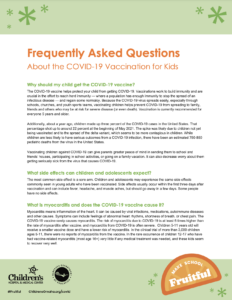Frequently Asked Questions About COVID-19 Vaccinations for Kids
Make the future fruitful by getting your child vaccinated and get fact-based answers from the medical experts at Children’s.
Why should my child get the COVID-19 vaccine?
The COVID-19 vaccine helps protect your child from getting COVID-19. Vaccinations work to build immunity and are crucial in the effort to reach herd immunity — where a population has enough immunity to stop the spread of an infectious disease — and regain some normalcy. Because the COVID-19 virus spreads easily, especially through schools, churches, and youth sports teams, vaccinating children helps prevent COVID-19 from spreading to family, friends and others who may be at risk for severe disease (or even death). Vaccination is currently recommended for everyone 12 years and older.
Additionally, about a year ago, children made up three percent of the COVID-19 cases in the United States. That percentage shot up to around 22 percent at the beginning of May 2021. The spike was likely due to children not yet being vaccinated and to the spread of the delta variant, which seems to be more contagious in children. While children are less likely to have serious outcomes from a COVID-19 infection, there have been an estimated 300-600 pediatric deaths from the virus in the United States.
Vaccinating children against COVID-19 can give parents greater peace of mind in sending them to school and friends’ houses, participating in school activities, or going on a family vacation. It can also decrease worry about them getting seriously sick from the virus that causes COVID-19.
What side effects can children and adolescents expect?
The most common side effect is a sore arm. Children and adolescents may experience the same side effects commonly seen in young adults who have been vaccinated. Side effects usually occur within the first three days after vaccination and can include fever, headache, and muscles aches, but should go away in a few days. Some people have no side effects.
What is myocarditis and does the COVID-19 vaccine cause it?
Myocarditis means inflammation of the heart. It can be caused by viral infections, medications, autoimmune diseases and other causes. Symptoms can include feelings of abnormal heart rhythms, shortness of breath, or chest pain. The COVID-19 vaccine rarely causes myocarditis. The risk of myocarditis due to COVID-19 is at least 6 times higher than the rate of myocarditis after vaccine, and myocarditis from COVID-19 is often severe. Children 5-11 years old will receive a smaller vaccine dose and have a lower risk of myocarditis. In the clinical trial of more than 3,000 children ages 5-11, there were no reports of myocarditis from the vaccine. In the rare occurrence of children 12-17 who have had vaccine-related myocarditis (most age 16+) very little if any medical treatment was needed, and these kids seem to recover very well.
What were the results of the Pfizer clinical trial in adolescents?
The Pfizer clinical trial found no symptomatic infections among vaccinated adolescents age 12 to 15. The participants produced strong antibody (immune) responses and had side effects similar to 16- to 25-year-olds. The vaccine appeared to be at least as effective – if not more – for adolescents than for adults.
If my child has an underlying condition, can they get a COVID-19 vaccine?
People with underlying medical conditions can receive a COVID-19 vaccine as long as they have not had an immediate or severe allergic reaction to a COVID-19 vaccine or to any of the ingredients in the vaccine. Talk to your child’s doctor about vaccination considerations for your child with underlying medical conditions. Vaccination is an important consideration for people of any age with certain underlying medical conditions because they are at increased risk for severe illness from COVID-19.
If my child already had COVID-19, do they still need to get vaccinated with a COVID-19 vaccine?
Yes, children ages 5 and older should be vaccinated regardless of whether they have already had COVID-19. Research has not yet shown how long one is protected from getting COVID-19 again after they have recovered from COVID-19. Evidence is emerging that people get better protection by being fully vaccinated compared with having had COVID-19. If your child has a history of multisystem inflammatory syndrome (MIS-C) or was treated for COVID19 with monoclonal antibodies, you should wait 90 days before your child gets a COVID-19 vaccine. Talk to your doctor if you are unsure what treatments your child received or if you have more questions about when to get them a COVID-19 vaccine.
Does my child need to wear a mask and avoid close contact with others if they are fully vaccinated?
After your child is fully vaccinated for COVID-19 you can resume many activities without wearing a mask or staying six feet apart, except:
- if you are indoors in public and you are in an area of substantial or high transmission
- or where required by federal, state, local, tribal, or territorial laws, rules, and regulations, including local business and workplace guidance.
I’m still nervous about my child getting the vaccine.
It’s okay to be nervous. It means you care about the health and wellbeing of your child. Take time to learn about the vaccines from reputable sources, like the Centers for Disease Control (CDC) & Children’s Hospital & Medical Center. We need everyone’s help to end the pandemic – including our young people. Some experts believe we need 80 to 90 percent of the population to be immune to achieve herd immunity. Vaccinating your child can help protect them from long term symptoms, hospitalization and even death. They are also protecting the health of those who cannot get vaccinated or who are at high risk of severe disease.
Find a vax location and stay informed about COVID-19 vaccinations for kids.

